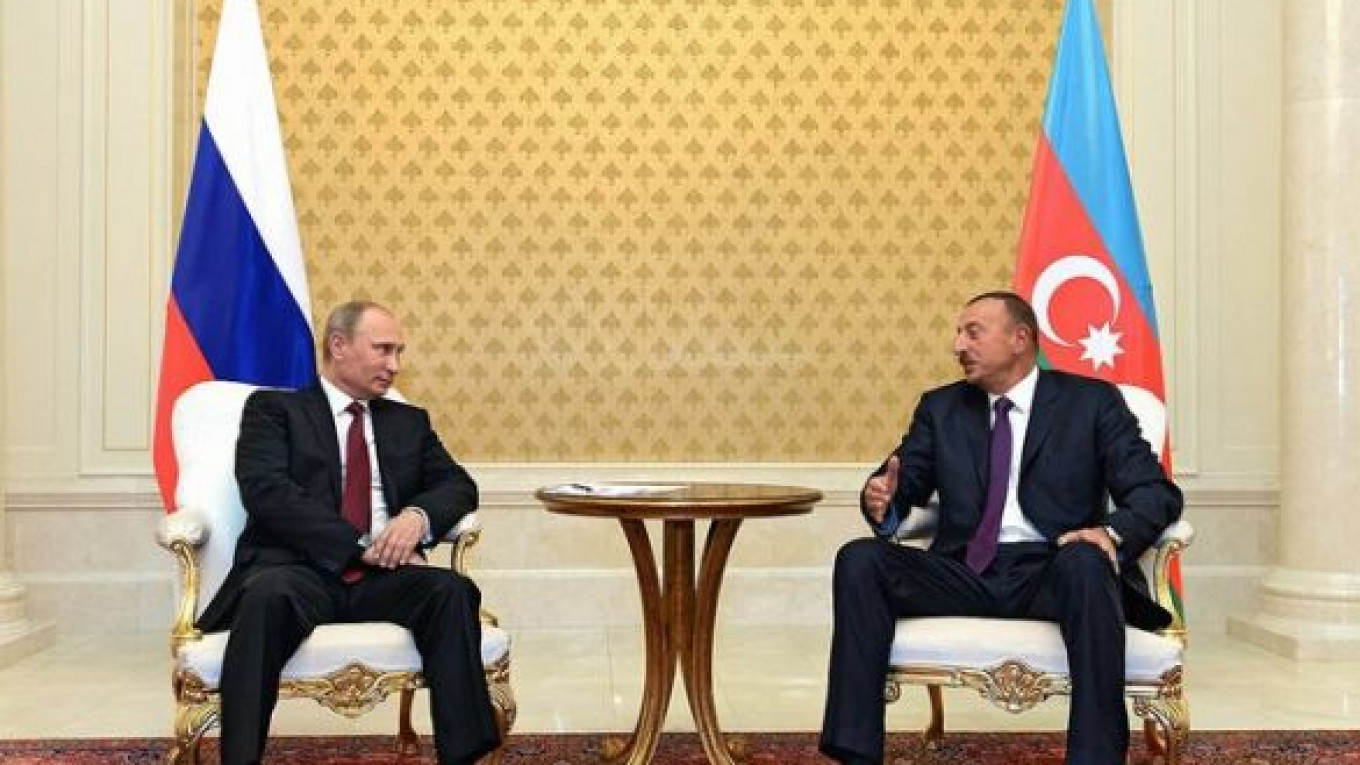President Vladimir Putin met with his Azeri counterpart Ilham Aliyev in Baku on Tuesday in what proved to be a fruitful visit, but one which led some to express caution about Russia’s influence in the republic.
The visit came just a few weeks before presidential elections are set to take place in the South Caucasian oil-fueled republic, and it was widely seen as a sign that Azerbaijan is seeking to stay close to Moscow after deciding in June to cancel participation in the Nabucco pipeline — a project developed by the European Union in order to diversify gas deliveries from Russia. ?
And as if to prove that the visit was equally important to Russia, six government ministers also attended, including Energy Minister Alexander Novak and Defense Minister Sergei Shoigu, as well as heads of Russia’s biggest oil companies, Rosneft and Lukoil.
Putin praised Azerbaijan’s efforts to preserve the Russian language and culture and said he was pleased with the development of bilateral relations between the two countries.
“I would like to emphasize once more that Azerbaijan takes the development of Russian very seriously. … Russian schools and university branches operate here quite actively,” he said.
Echoing Putin’s sentiments, Aliyev said that Russia and Azerbaijan share similar opinions on a wide range of issues, and he thanked Putin for bringing along such a “representative” delegation.
Igor Sechin, head of Russia’s top crude producer, Rosneft, and Rovnag Abdullaev, head of the State Oil Company of Azerbaijan signed a broad cooperation agreement on join exploration, extraction and mutual deliveries of oil. The agreement provides for asset swaps and joint production.
After the agreement was signed, Sechin told reporters that an array of different areas would be developed, including “reciprocal deliveries, swap operations and opportunities for the use of joint infrastructure.”
Despite the positive results of the meeting, however, some say the buddy-buddy relationship on display was cause for concern.
Azerbaijani investigative journalist Khadija Ismayilova, who currently works for Radio Free Europe, said by phone that the visit proved that Azerbaijan could not be truly independent.
“Without Moscow’s support, Aliyev would not have come into power in 2003. This is a critical election for him, so he is willing to make concessions to Moscow in order to win its support,” she said from Baku.
Incidentally, Aliyev got more competition on the eve of Putin’s visit, as Azerbaijan’s National Council of Democratic Forces nominated Oscar-Winning screenwriter Rustam Ibragimbekov as its candidate for the presidential race.
In order for Ibragimbekov to register as an eligible candidate, however, he’d first have to surrender his Russian citizenship, something that Murad Gassanly, a member of the opposition’s campaign team, said “is being addressed at the highest level.”
Elkhan Sahinoglu, head of the Atlas Political Research Center in Baku, said that several Azerbaijani billionaires held a meeting in Moscow to discuss the option of supporting an opposition candidate — though a final decision would still be left to Putin.
“After Russia’s lease of the Gabala radar station in Azerbaijan ended, and considering the termination of the Baku-Novorossiysk pipeline agreement, we all saw this visit as a surprise,” he said. “But it seems that Baku had to reach out to Putin to seek support for the upcoming election.”
According to Sahinoglu, Putin can prolong the decision on Ibragimbekov’s Russian citizenship in order to keep him out of the race and secure a victory for Aliyev.? ?
Russia’s influence in Azerbaijan stems mostly from its position in resolving the Nagorno-Karabakh conflict. The six-year war between Azerbaijan and Armenia, which began in 1988, led to a stalemate that continues to this day. Nagorno-Karabakh, a region in the Caucasian mountains that is? internationally recognized as part of Azerbaijan, has claimed independence from the republic.
It is precisely this situation that gives Russia more leverage, making some wary of such friendly meetings between the two nations, analysts say.?
“Azerbaijan’s intellectual elite and the public at large is cautious about Putin’s visit to our country,” said Farda Asadov, Vice Rector at the Khazar University in Baku.
“There is a sense that Russia is deliberately trying to prolong the Nagorno-Karabakh conflict in order to maintain its influence in the region. We believe that it must adopt a new approach to this problem, one that will genuinely be aimed at finally resolving it,” he said.
A Message from The Moscow Times:
Dear readers,
We are facing unprecedented challenges. Russia's Prosecutor General's Office has designated The Moscow Times as an "undesirable" organization, criminalizing our work and putting our staff at risk of prosecution. This follows our earlier unjust labeling as a "foreign agent."
These actions are direct attempts to silence independent journalism in Russia. The authorities claim our work "discredits the decisions of the Russian leadership." We see things differently: we strive to provide accurate, unbiased reporting on Russia.
We, the journalists of The Moscow Times, refuse to be silenced. But to continue our work, we need your help.
Your support, no matter how small, makes a world of difference. If you can, please support us monthly starting from just $2. It's quick to set up, and every contribution makes a significant impact.
By supporting The Moscow Times, you're defending open, independent journalism in the face of repression. Thank you for standing with us.
Remind me later.


